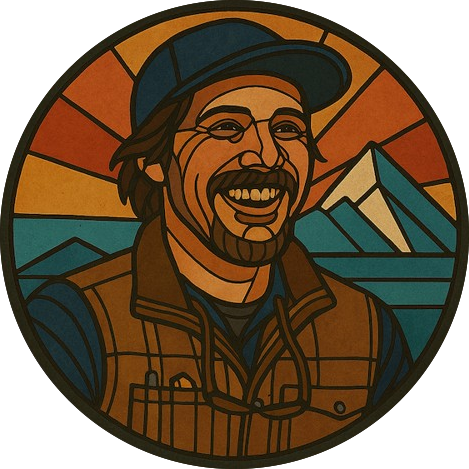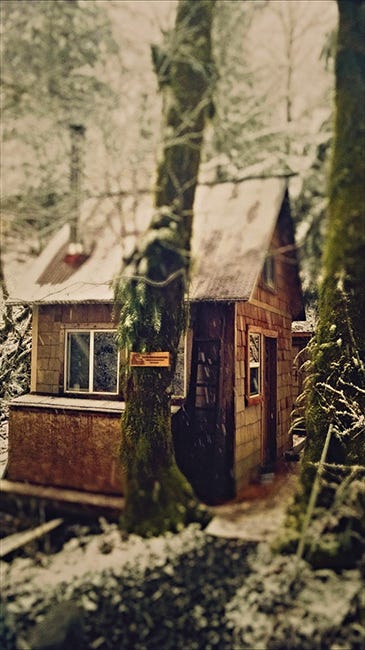Dying Breed Dialogues: Patrick Hutchison on What Restoring a Cabin in the Woods Taught Him About Confidence and Contentment
Fixing up a crappy cabin as a catalyst for developing competence, building connection, and finding meaning. Plus, the perfect meal for eating in a cabin.
Many people fantasize about owning a cabin in the woods where there’s no cell service and the only thing you got is time and nature. Almost no one follows through on the dream. Patrick Hutchison did.
In his mid-twenties, feeling adrift in a soul-sucking copywriting job, he borrowed $7,500 and bought a collapsing, dilapidated cabin in Washington’s Cascades. He had no carpentry experience, no plan, and hardly any money. Little did Patrick know that this fixer-upper project would turn into an education in craftsmanship, friendship, and finding meaning in life.
Patrick isn’t a stranger to longtime AoM readers. Back in the day, he wrote DIY articles for the AoM website and researched and outlined many of the illustrated guides that were both published on the blog and in The Illustrated Art of Manliness.
Patrick’s work for AoM was one of many moonlighting jobs he did to fund his cabin remodel. In his book, Cabin: Off the Grid Adventures with a Clueless Craftsman, Patrick tells the story of the cabin: the rotten joists he repaired, the meals cooked by lamplight, the long winters huddled with friends around a wood stove, and how all of it reshaped his sense of competence and contentment. The cabin also led him to a new career: carpenter.
I talked with Patrick about what possesses someone to buy a derelict cabin with no idea how to fix it up, what manual labor teaches that desk work can’t, and how trial-and-error learning can build your confidence. We also got into what makes a cabin a “real” cabin, the “jazz” of carpentry, and the underrated power of a four-foot level.
The interview has been edited for length and clarity.
You bought a cabin in the Cascades that needed extensive repairs, and you had no carpentry experience other than building treehouses as a kid. Why did you decide to buy this random small cabin in the middle of nowhere?
It’s really hard to pinpoint the exact reason why. I was in my mid-twenties when I bought the cabin, and I was sort of floundering. I had thought I was a career-minded person doing copywriting, but it wasn’t going great, and I wasn’t finding fulfillment in it. I was looking for something else to feel engaged with, something to feel like my life was on track. That had started as a desire to maybe buy a house, make some sort of big investment that felt like the mark of adulthood.
But the reality was I couldn’t afford those things. So that search kept filtering down until it was like, what if I bought a smaller place farther away? It kept filtering down until even if I had any money — which I didn’t — the only places I could maybe buy would be these little cabins way out in the middle of nowhere. And I can’t afford those, and I can’t get loans for them. It became this hopeless search.
Then the house I was living in got robbed. I was on Craigslist looking for stuff we previously owned that might show up for sale, and I just happened to throw “cabin” in the search bar on a whim. This listing came up: $7,500. I had been looking at derelict cabins for months, even had a real estate agent sending me $50,000-$60,000 cabins that were totally falling down. But I’d never seen anything even remotely that cheap, and I was vaguely familiar with the area where the cabin was located. It felt like, “Oh, I have to go check this out.” Even though I didn’t have $7,500, I thought that’s a low enough amount of money that maybe I can sell things, maybe I can borrow from friends who want to be in on it. There can maybe be a way that I could make this work if it’s something that I want to do.
So it started as discontent, but then shifted into something you were actually attracted to?
Yeah. Once I was looking at these cabins, I was like, “Thank God. That’s what I want in life. A cabin.” Life felt like it was moving very fast. Friends were getting married, thinking about having kids, going to grad school. Everything was moving fast around me, and I thought, this is what I want — just a place where I can go and all my friends can go, where things will sort of freeze time for a little bit.
It felt like an escape from a lot of things — an escape from living in a city, from feeling we needed to be on top of all these responsible portions of our lives, an escape from being an adult. It reminded me of those tree fort days in the summer when I was a kid, these magical, intimate places where you can just go and have fun and nothing else matters.
You describe creating “future memories” for yourself when you first saw the cabin. What were some of those?
A lot of those fantasies came out of conversations with friends about like, “Oh man, it’d be so rad if we could go up there every weekend. We’d get really good at fishing, and we’d go snowboarding all the time, and we’d learn how to forage in the woods. What if we got really good at mushroom foraging, and we just go out during the day with nothing but our little guidebook, and we pick a bunch of wild edibles and make this amazing dinner, and then have a fire.”
Different fantasies with different friends who had shared interests.
For some people, it was outdoor activities, and for others, it was thoughts of winter and getting really cozy inside with a fire going. For others, it was this base camp to get to activities like snowboarding or rafting or hiking. When I got there, it was easy to fantasize all those things immediately.
Let’s talk about the cabin itself. What do you mean when you say “cabin”?
I think what it means more than anything is that it’s got to be a place that is, on paper, more difficult to be in. A true cabin doesn’t have utilities, running water, electricity, or indoor plumbing. Basically every single thing that you need to be entertained and warm and comfortable and fed comes from a manual process that you undertake.
You’re cooking for yourself, creating a fire that warms you up, dismantling and cleaning hurricane lamps that give you light, braving some trek to an outhouse, washing dishes without hot water. What makes cabins great is the absence of those conveniences, because there’s something really meditative about going through each of those tasks.
When so much of life can be automated and very easy, I think there’s a part of us that loses out on the minuscule self-esteem boosts that creating a fire to make yourself warm can achieve. Those tasks can make you feel productive, and that feeling has some momentum and infectiousness that makes you want to be productive in other ways. You make the fire, and then you’re like, “Oh, I should do the dishes.” It creates this positive brain flow cycle.
The last thing about a real cabin is that it should be a small, intimate space. Those small intimate spaces make it so that the people who are there with you are engaged with you more. It feels like a place where you could whisper a conversation, where you could be more vulnerable, more open. Those things all make for better conversations and connections.
How big was your cabin, and what kind of repairs did it need?




